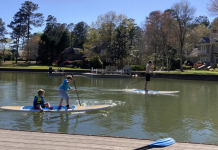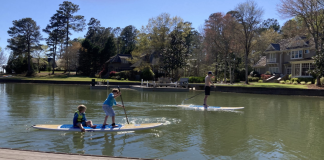I’m guilty. I spend a lot of time on social media.
I manage accounts for my job and I manage accounts for my own personal use. Facebook has been a constant communication tool in my life since my university was one of the first to have it 15 years ago. These days, how I use the communication tool as a parent has changed in more ways than I ever thought possible.
Late night party pictures have been replaced with photo albums to document my children’s lives. My mom can watch live video of my daughter’s softball at-bat and then I can chat with an old friend or family member in messenger.
Individual profiles paved the way for business accounts to fan pages and massive online communities called Facebook groups.
Neighborhoods often host a multitude of highly engaging Facebook groups with access granted by a group administrator based on addresses. In my area of Hoover we have a moms group, a buy/sell/trade group, a babysitters group, a seniors group, a networking group for professionals, and many more.
The purpose of Facebook groups is to build community and create a real time help line. There are those times when the conversation goes a little too far.
Earlier this year, we experienced a very serious incident in the neighborhood. Deliveries were disappearing from front porches in broad daylight. It went on for several weeks. Concerned neighbors banned together to share images, descriptions, and video feeds from their home security cameras in an effort to aid police and warn neighbors.
The actions of well-meaning neighbors turned into a racially charged profiling case that left a lot of neighbors conflicted and angered. We learned that many of our neighbors fit the description of the perpetrator. Innocent neighbors became the accused while going about their lives because they fit the description in the Facebook group news feed.
How does this happen?
If you look at your own social media interactions, it is not hard to see. We have all seen the memes and commentary on the different types of personas found in Facebook groups.
- The Anti-Google: asks those in the page for advice, Uber rides, hours of operation of area businesses, and other things Google can find quickly
- The Can’t Use the Search Function: always posting about something already posted ten times that month
- The Promoter: shameless self-promotion of a business or service or event
- The Tattler: posts video or photographic evidence of any perceived wrong doing
- The Busy-Body: that nosy neighbor who posts a minimum of five times per day about anything and everything
- The Dog-Hater: posts constantly about dog poop in the yard
- The Kid-Hater: mean-spirited posts about wild youth disguised as “concern”
- The Fun-Hater: complains about the amenities the neighborhood provides and any activity happening “after a reasonable time”
- The Pot-Stirrer: drops in a dramatic GIF just to keep the conversation moving, even if they have no opinion to share on the matter

Facebook groups are designed around a common interest. Motherhood or geographic location are two examples. While membership and posts in these groups aren’t anonymous, they certainly are not the same as face-to-face interactions. They normalize verbal sparring and passive-aggressive behavior.
The “share” button is not permission to say anything about or to anyone inside a closed group. It’s not for humble brags or public shaming aimed at an audience of neighbors. There are courtesies and etiquette implied — if not enforced by the group administrator, by your own moral compass.
Here are my best practices to let your best self be seen on the neighborhood Facebook groups.
Using a stoplight analogy . . . Green means go. Post about topics that fall within the parameters of how closed groups are intended to be used. Yellow means yield and proceed with caution. These posts walk a line and can be fine or easily misconstrued. Red is just a stop. Do not pass go and do not collect $200 because negative backlash is coming for you.
Green Light ::
- Gather feedback on a local business or service provider
- Ask for assistance with a project or problem
- Praise a neighbor
- Promotion of neighborhood news or information
Yellow Light ::
- Addressing a safety concern
- Share something you think will be useful to the masses — an event or special promotion
- Any post that you feel the need to preface with “Not to be rude” or “I mean no disrespect”
- Screen shots of other posts or conversations (that’s right, nothing is truly private on social media)
Red Light ::
- Photos of minors in any capacity without parental consent
- Photos while driving
- Anything you can find on Google quicker than it takes to type the post
- Any form of public shaming to a group or individual
To wrap this up into a neat little package, I have to share advice from master lyricist IceCube: Check yo self before you wreck yo self. Just because it’s social media doesn’t mean feelings aren’t involved. If you have a situation, observation, or comment to share but wouldn’t say it to someones face . . . don’t share it on social media.
It really is that simple.
While the incident in our neighborhood has since been buried thanks to the magic of the Facebook algorithm, it doesn’t mean the hurt feelings and backlash have been forgotten. It only takes once.
Remember to check yo self before you hit the share button. It is okay to leave things unsaid on social media.











